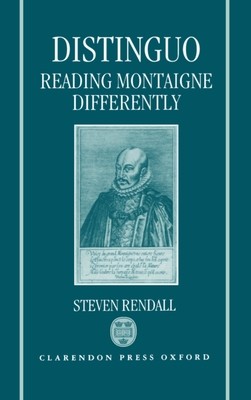
- We will send in 10–14 business days.
- Author: Steven Rendall
- Publisher: Clarendon Press
- ISBN-10: 0198151802
- ISBN-13: 9780198151807
- Format: 14 x 21.6 x 1.3 cm, hardcover
- Language: English
- SAVE -10% with code: EXTRA
Reviews
Description
Most modern critics (even those who have emphasized the "evolution" of Montaigne's ideas) have sought to explain away the contradictions and incoherences of Montaigne's Essais. Rendall investigates the role of these internal differences in the opinions recorded, in voices and modes of discourse, in logical levels, in conceptions of writing and of reading, through a series of careful, lucid readings of selected passages of Essais. The author tracks their operation in the text and shows how Montaigne's writing constantly recontextualizes his own discourse--through his practice of interpolating new material in successive editions and adding new chapters--as well as that of other authors through quotation, paraphrase, and commentary. Rather than merely negative features, Rendall argues that such "differences" are essential to a practice of writing that both defines and challenges a notion of "unity" and can be seen as an uneasy and disturbing element related to a historical shift
from earlier ways of controlling meaning to one based on "the author function." This careful and lucid book presents a fresh and significant interpretation of the Essais and shows how Montaigne's work might be read in a "different" way.
EXTRA 10 % discount with code: EXTRA
The promotion ends in 19d.12:51:20
The discount code is valid when purchasing from 10 €. Discounts do not stack.
- Author: Steven Rendall
- Publisher: Clarendon Press
- ISBN-10: 0198151802
- ISBN-13: 9780198151807
- Format: 14 x 21.6 x 1.3 cm, hardcover
- Language: English English
Most modern critics (even those who have emphasized the "evolution" of Montaigne's ideas) have sought to explain away the contradictions and incoherences of Montaigne's Essais. Rendall investigates the role of these internal differences in the opinions recorded, in voices and modes of discourse, in logical levels, in conceptions of writing and of reading, through a series of careful, lucid readings of selected passages of Essais. The author tracks their operation in the text and shows how Montaigne's writing constantly recontextualizes his own discourse--through his practice of interpolating new material in successive editions and adding new chapters--as well as that of other authors through quotation, paraphrase, and commentary. Rather than merely negative features, Rendall argues that such "differences" are essential to a practice of writing that both defines and challenges a notion of "unity" and can be seen as an uneasy and disturbing element related to a historical shift
from earlier ways of controlling meaning to one based on "the author function." This careful and lucid book presents a fresh and significant interpretation of the Essais and shows how Montaigne's work might be read in a "different" way.


Reviews